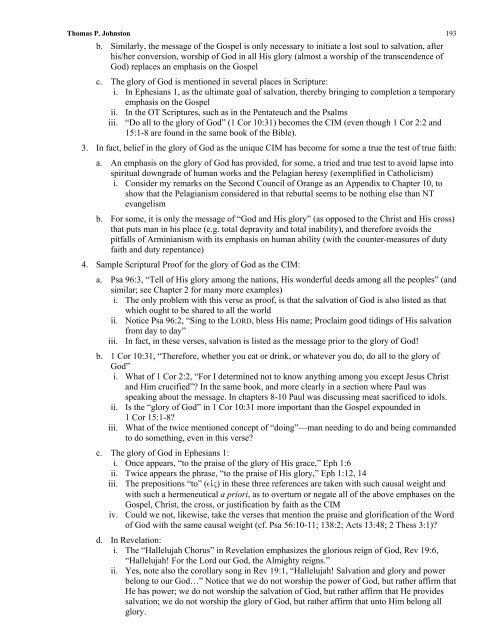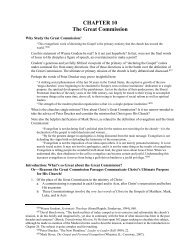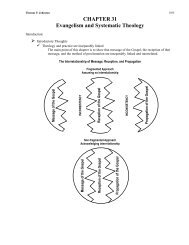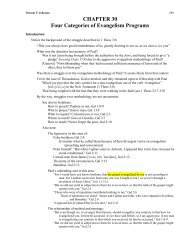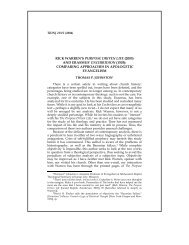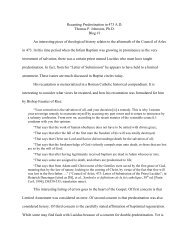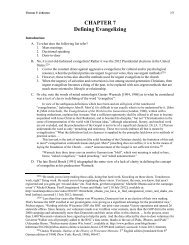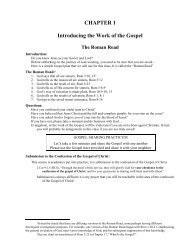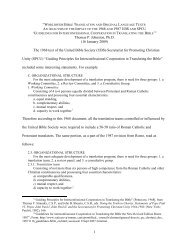Motivations and Urgency of Evangelism - Evangelism Unlimited
Motivations and Urgency of Evangelism - Evangelism Unlimited
Motivations and Urgency of Evangelism - Evangelism Unlimited
Create successful ePaper yourself
Turn your PDF publications into a flip-book with our unique Google optimized e-Paper software.
Thomas P. Johnston 193<br />
b. Similarly, the message <strong>of</strong> the Gospel is only necessary to initiate a lost soul to salvation, after<br />
his/her conversion, worship <strong>of</strong> God in all His glory (almost a worship <strong>of</strong> the transcendence <strong>of</strong><br />
God) replaces an emphasis on the Gospel<br />
c. The glory <strong>of</strong> God is mentioned in several places in Scripture:<br />
i. In Ephesians 1, as the ultimate goal <strong>of</strong> salvation, thereby bringing to completion a temporary<br />
emphasis on the Gospel<br />
ii. In the OT Scriptures, such as in the Pentateuch <strong>and</strong> the Psalms<br />
iii. “Do all to the glory <strong>of</strong> God” (1 Cor 10:31) becomes the CIM (even though 1 Cor 2:2 <strong>and</strong><br />
15:1-8 are found in the same book <strong>of</strong> the Bible).<br />
3. In fact, belief in the glory <strong>of</strong> God as the unique CIM has become for some a true the test <strong>of</strong> true faith:<br />
a. An emphasis on the glory <strong>of</strong> God has provided, for some, a tried <strong>and</strong> true test to avoid lapse into<br />
spiritual downgrade <strong>of</strong> human works <strong>and</strong> the Pelagian heresy (exemplified in Catholicism)<br />
i. Consider my remarks on the Second Council <strong>of</strong> Orange as an Appendix to Chapter 10, to<br />
show that the Pelagianism considered in that rebuttal seems to be nothing else than NT<br />
evangelism<br />
b. For some, it is only the message <strong>of</strong> “God <strong>and</strong> His glory” (as opposed to the Christ <strong>and</strong> His cross)<br />
that puts man in his place (e.g. total depravity <strong>and</strong> total inability), <strong>and</strong> therefore avoids the<br />
pitfalls <strong>of</strong> Arminianism with its emphasis on human ability (with the counter-measures <strong>of</strong> duty<br />
faith <strong>and</strong> duty repentance)<br />
4. Sample Scriptural Pro<strong>of</strong> for the glory <strong>of</strong> God as the CIM:<br />
a. Psa 96:3, “Tell <strong>of</strong> His glory among the nations, His wonderful deeds among all the peoples” (<strong>and</strong><br />
similar; see Chapter 2 for many more examples)<br />
i. The only problem with this verse as pro<strong>of</strong>, is that the salvation <strong>of</strong> God is also listed as that<br />
which ought to be shared to all the world<br />
ii. Notice Psa 96:2, “Sing to the LORD, bless His name; Proclaim good tidings <strong>of</strong> His salvation<br />
from day to day”<br />
iii. In fact, in these verses, salvation is listed as the message prior to the glory <strong>of</strong> God!<br />
b. 1 Cor 10:31, “Therefore, whether you eat or drink, or whatever you do, do all to the glory <strong>of</strong><br />
God”<br />
i. What <strong>of</strong> 1 Cor 2:2, “For I determined not to know anything among you except Jesus Christ<br />
<strong>and</strong> Him crucified”? In the same book, <strong>and</strong> more clearly in a section where Paul was<br />
speaking about the message. In chapters 8-10 Paul was discussing meat sacrificed to idols.<br />
ii. Is the “glory <strong>of</strong> God” in 1 Cor 10:31 more important than the Gospel expounded in<br />
1 Cor 15:1-8?<br />
iii. What <strong>of</strong> the twice mentioned concept <strong>of</strong> “doing”—man needing to do <strong>and</strong> being comm<strong>and</strong>ed<br />
to do something, even in this verse?<br />
c. The glory <strong>of</strong> God in Ephesians 1:<br />
i. Once appears, “to the praise <strong>of</strong> the glory <strong>of</strong> His grace,” Eph 1:6<br />
ii. Twice appears the phrase, “to the praise <strong>of</strong> His glory,” Eph 1:12, 14<br />
iii. The prepositions “to” (eivj) in these three references are taken with such causal weight <strong>and</strong><br />
with such a hermeneutical a priori, as to overturn or negate all <strong>of</strong> the above emphases on the<br />
Gospel, Christ, the cross, or justification by faith as the CIM<br />
iv. Could we not, likewise, take the verses that mention the praise <strong>and</strong> glorification <strong>of</strong> the Word<br />
<strong>of</strong> God with the same causal weight (cf. Psa 56:10-11; 138:2; Acts 13:48; 2 Thess 3:1)?<br />
d. In Revelation:<br />
i. The “Hallelujah Chorus” in Revelation emphasizes the glorious reign <strong>of</strong> God, Rev 19:6,<br />
“Hallelujah! For the Lord our God, the Almighty reigns.”<br />
ii. Yes, note also the corollary song in Rev 19:1, “Hallelujah! Salvation <strong>and</strong> glory <strong>and</strong> power<br />
belong to our God…” Notice that we do not worship the power <strong>of</strong> God, but rather affirm that<br />
He has power; we do not worship the salvation <strong>of</strong> God, but rather affirm that He provides<br />
salvation; we do not worship the glory <strong>of</strong> God, but rather affirm that unto Him belong all<br />
glory.


